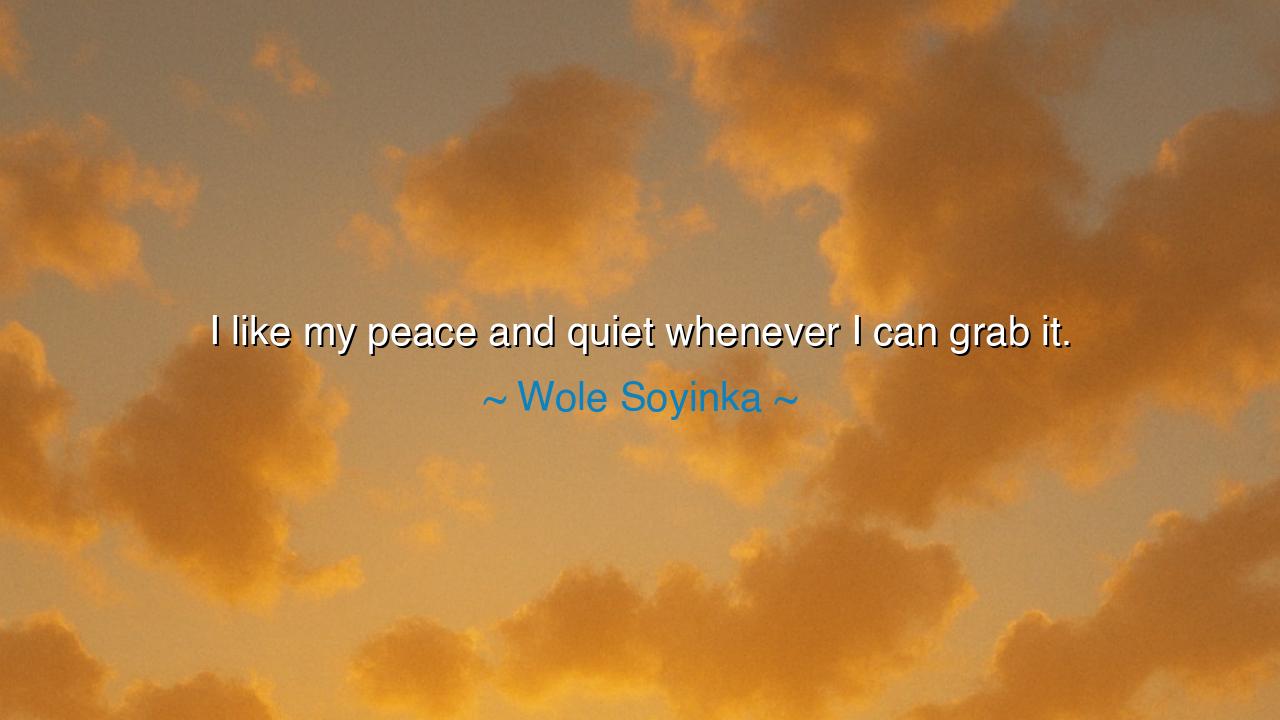
I like my peace and quiet whenever I can grab it.






Hear the words of Wole Soyinka, poet, warrior of truth, and voice of a people: “I like my peace and quiet whenever I can grab it.” At first, the saying seems simple, almost ordinary, as though it were the sigh of a weary man. Yet in truth it is the utterance of one who has known storms, prisons, and exiles, and who therefore treasures stillness as a jewel more precious than gold. For those who walk through strife learn that peace and quiet are not idle luxuries, but sanctuaries of the spirit, rare and holy.
The ancients knew this truth. They built temples not merely to worship the gods, but to give men and women places of silence where they might listen to the whispers of their own souls. The prophet retreated into the desert, the monk into his cell, the philosopher into his garden. Each sought what Soyinka calls his peace and quiet—not to flee from the world, but to gather strength to face it again. For silence heals the wounds that noise cannot touch, and peace restores the courage to act with wisdom.
Consider Soyinka’s own life. As a writer who dared to challenge tyranny, he was imprisoned in solitary confinement during Nigeria’s civil war. Stripped of freedom, denied the fellowship of others, he discovered that even in chains, one must fight to preserve an inner refuge of quiet. His writings from that time, forged in darkness, remind us that true strength is not only found in struggle, but also in the moments when the soul withdraws from battle to rest in itself. Thus, when he speaks of seizing peace and quiet whenever he can, he speaks as one who has learned to value them through suffering.
History too gives us examples. Think of Marcus Aurelius, emperor of Rome, beset by endless wars and the weight of empire. Surrounded by soldiers, courtiers, and the demands of a world in turmoil, he turned inward to his Meditations. In the stillness of the camp tent, he grasped fragments of peace and quiet, writing reflections that continue to guide seekers of wisdom centuries later. He knew, as Soyinka knew, that without stillness, even the strongest spirit withers.
The meaning is therefore twofold: first, that peace and quiet must be seized, for the world rarely offers them freely; and second, that within these moments lies the key to endurance. They are not escapes from duty, but sources of renewal. Just as the warrior sharpens his blade before battle, so must the soul sharpen itself in silence before engaging the noise of the world.
The lesson is clear: do not despise stillness, nor imagine that constant action alone sustains life. Seek your peace and quiet daily, whether in the silence of dawn, the pause between labors, or the retreat of evening. Step away from the clamor of voices, the burden of endless tasks, and let your soul drink from the well of calm. In such moments, wisdom grows, patience deepens, and strength is restored.
So, children of tomorrow, follow Soyinka’s teaching. Do not wait until the world gives you rest—grab it when you can. Guard your peace as you would a treasure, and defend your quiet as you would a fortress. For in the sanctuary of silence, you will find the clarity to live, the courage to fight, and the harmony to love. And when the storms of life rise again, you will be ready, for your soul will have been strengthened in the still waters of peace.






AAdministratorAdministrator
Welcome, honored guests. Please leave a comment, we will respond soon